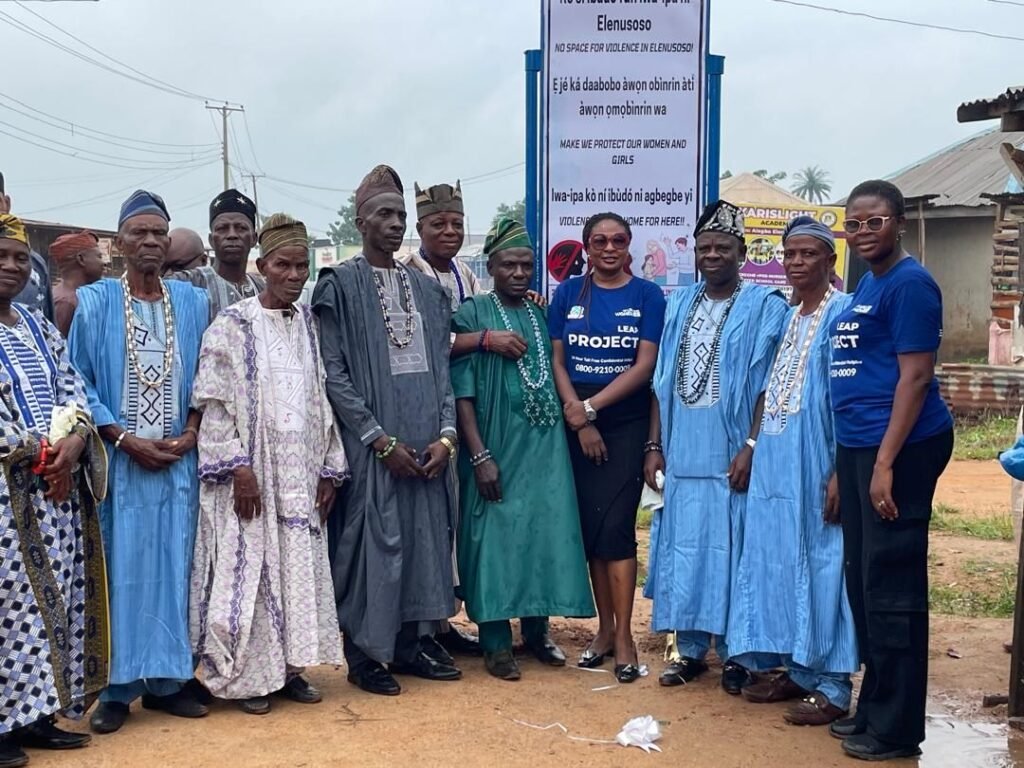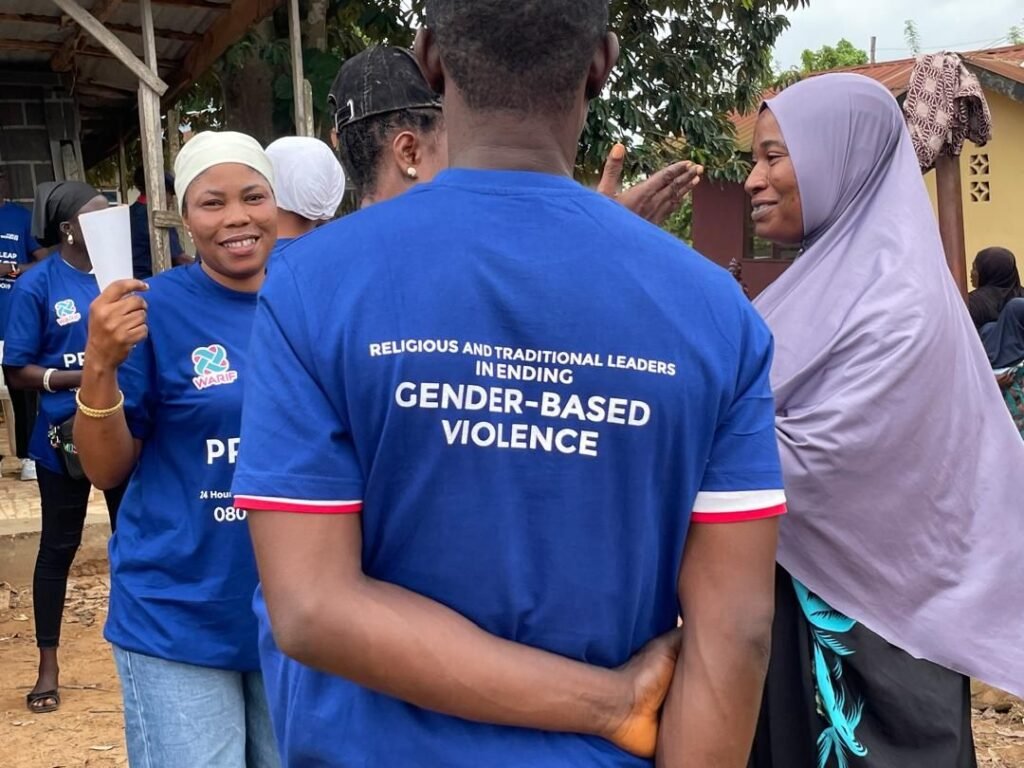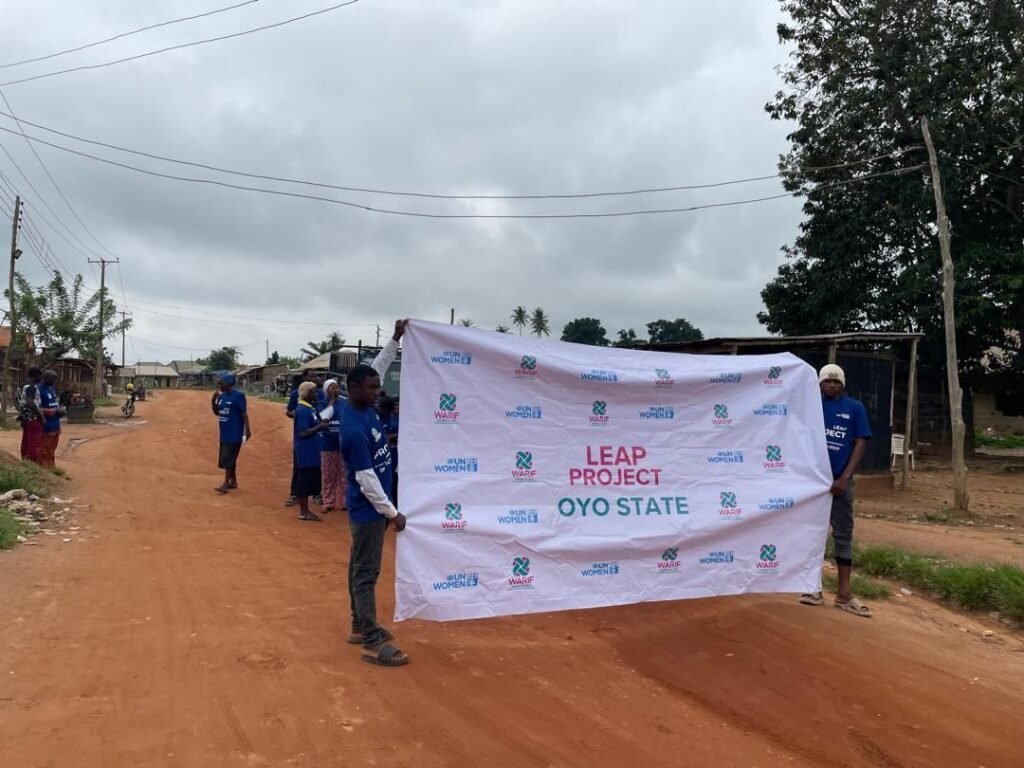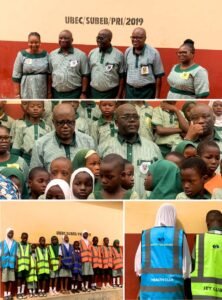From Silence to Strength: Elenushonsho’s Bold Fight Against SGBV
By Isaac Olufemi Ojo

A month after declaring zero tolerance for Sexual and Gender-based Violence
(SGBV), Elenushonsho, an agrarian community on the outskirts of Ibadan, is
taking bold steps to protect the rights of women and girls.
In the heart of Ido Local Government Area lies Elenushonsho—a forgotten
community where the footprints of government are scarcely seen. Deprived of a
primary healthcare center, burdened by impassable roads, and left without security
personnel, residents are forced to fend for themselves. This neglect has deepened
their vulnerability, especially for women and girls, in a region increasingly scarred
by sexual and gender-based violence.
Isolated by its remote location and serving as a hub for over 120 surrounding
villages, Elenushonsho suffers from a total absence of state security. This vacuum
has made the community a breeding ground for various forms of crime,
particularly sexual and gender-based violence (SGBV).
Common abuses include the forced marriage of girls under 18—locally referred to
as Ashate marriage—domestic violence, and rape. These acts, though outlawed
under Nigeria’s federal and Oyo State Violence Against Persons Prohibition
(VAPP) Law, continue to thrive in the shadows of underdevelopment and neglect.
Global data from UNFPA Nigeria | Gender-based violence shows that 1 in 3
women have experienced Gender violence, while 1 in 4 women have also been
victims of domestic violence in Nigeria.
In a research titled: Gender-Based Violence: A Silent Epidemic, Knowledge and
Patterns in Ibadan, Oyo State carried out by four researchers in Ibadan Oyo state
capital in 2024, data shows that of the 220 respondents 55.9 percent are ignorant
about Sexual and Gender Based Violence, while 88.6 percent have through one
form of physical abuse at one time or the other.
Determined to break the cycle of abuse and raise awareness about sexual and
gender-based violence, two courageous community leaders in Elenushonsho took a
decisive stand. In partnership with the Women at Risk International Foundation
(WARIF), they launched a bold initiative to educate residents and end
SGBV—affirming that ignorance of the law is no longer an excuse.

The initiative was spearheaded by Bishop Oriola Salaam and Oloye Adebayo
Babajide, the Atunluse of the Elenusonso community, who made an open
declaration of the community’s commitment to ending SGBV. With support from
WARIF and the Oyo State Government, the leaders emphasized that the campaign
aims to educate and sensitize residents about the dangers of sexual and gender-
based violence, the community’s zero-tolerance stance, and the legal consequences
awaiting offenders found guilty under the law.
Bishop Oriola explained that the community’s stance against SGBV was boldly
displayed on a large board opposite the traditional ruler’s palace, serving as a
constant reminder to residents. He acknowledged past incidents of assault on
young girls and domestic violence but noted that community leaders had managed
to curb them. “Due to previous experience, we’ve agreed that no young girl should
be out after 7 p.m. However, with the new commitment of the community on
SGBV, we are hopeful that things will change and we’ll continue to reinforce this
message at our monthly evaluation meetings every last Friday of the month until it
becomes a norm. No one should bully or harm women or girls in this community,”
he said.
Another Traditional leader, Chief Rashidi Oladele-Salau described the open
declaration as a preventive step to address existing cases of SGBV and stop more
severe forms from emerging. “Prevention is better than a cure. This initiative
empowers our people to speak up, especially those who previously didn’t know
how to report abuse. Now that it is law—with a toll-free hotline (080092100009)
displayed on the central signboard—we believe all forms of gender-based violence
will be eliminated,” he said.
Chairman of Ido Local Government, Hon. Aderemi Adeojo—represented by
Community Development Officer, Mrs. Oluwadunni Hassan—commended the
initiative, describing it as long overdue given the rising cases of SGBV across the
region. She urged WARIF to replicate the campaign in other parts of the LGA.
“Gender-based violence in Ido is alarming. Apete, for instance, has seen many rape
cases. “I’m currently handling a case where a man has been raping his daughter for
six years. This intervention is desperately needed in our over 300 villages. I appeal
to men to stop maltreating women and allow them access to education. WARIF,
please help us extend this,” she pleaded.
A community member, Abduwaheed Bashiru, expressed optimism about the
initiative’s success, noting that with the declaration made, they would be on the
lookout for perpetrators in the community and ensure they face the wrath of the
law.
Adeola Pott-Johnson, Programme Lead at WARIF Lagos, explained that the
initiative to end SGBV in Elenushonsho was driven by two community leaders
who, after participating in a WARIF training last year, chose to apply their
knowledge locally. Recognizing widespread ignorance about SGBV and its legal
consequences under the Oyo State VAPP Law (2020), they led the community to
adopt a public declaration of zero tolerance.
“This is a community bylaw—an open declaration that SGBV will no longer be
tolerated. A large signboard placed near the palace makes this clear to all residents.
Ignorance is no longer an excuse,” she said.
She added that WARIF has provided a 24-hour toll-free hotline (080092100009) to
report cases of abuse, urging residents to speak up and seek help through the
available channels.
During a follow-up visit to Elenushonsho months after the public declaration,
stakeholders at the community’s monthly meeting reported noticeable changes in
residents’ attitudes toward SGBV. They noted that the initiative has not only raised
awareness but also empowered residents—especially women—to speak out against
abuse.
Aare Fatia Adetokun, the community’s traditional leader, shared a powerful
example of the impact: “I overheard a woman urging her friend to speak up if her
husband ever raised a hand against her. Our women are no longer afraid—now
they have a number to call, and our girls can walk freely without fear. That’s real
change,” he said.
Moreover, he noted that works were ongoing to improve the security architecture
of the community as an office spot is presently being installed for Officers of
NSCDC, the southwest security outfit (Amotekun) has also reached out, expressing
their willingness to have a base in the community to beef up security.
During a follow-up house-to-house sensitization walk led by WARIF Lagos on
July 11, 2025, it became evident that the alliance formed just weeks earlier was
already making a meaningful impact. The community’s growing awareness and
active participation reflected a positive shift in attitudes toward ending SGBV.

A community member, Mrs. Ayansola Monsurat explained that the open
declaration is a game changer and has empowered the women folks in the
Elenushonso community to be vocal and not suffer in silence.
Reflecting on past incidents, another community member Mrs. Bimbo Akintola
recalled how a physically challenged woman was once assaulted by her husband’s
brother, with the case quietly handled by traditional leaders. “Back then, we had no
one to report to. But now, things have changed. If it happens again, I’ll go straight
to the signboard and call WARIF,” she said, describing the intervention as a new
path to freedom.
Mr. Ogunjimi Diya, Director of Women’s Programs at the Oyo State Ministry of
Women Affairs and Social Inclusion, emphasized the importance of continuous
education in tackling GBV. He noted that such violations remain widespread
across Oyo communities, often fueled by ignorance, ego, and a lack of mutual
respect. “GBV is a developmental issue. Enlightened individuals are more likely to
work together for the progress of their homes and communities,” he said,
commending the ongoing sensitization efforts in Elenushonsho as a model for
others.
According to www.unwomen.org United Nations firmly asserts that SGBV,
particularly violence against women and girls (VAWG), is a fundamental human
rights violation, as enshrined in international agreements such as the Convention
on the Elimination of All Forms of Discrimination Against Women (CEDAW) and
the 1993 UN Declaration on the Elimination of Violence against Women.
However, the success of the public declaration and stand of the Elenushonsho
community against SGBV, with the support of the Women at Risk International
Foundation, Lagos in partnership with UN Women may suffer setbacks unduly if
measures and adequate policies from the government are not put in place.
Adeola Pott-Johnson of WARIF Lagos acknowledged key challenges affecting the
effectiveness of the SGBV campaign in Elenushonsho, including the absence of
security personnel, poor mobile network coverage, and deep-rooted cultural and
religious barriers. She emphasized the need for full implementation of the VAPP
Act to protect women’s rights.
While WARIF’s toll-free hotline (080092100009) and communication channels
have been instrumental in Lagos, data on reports from Elenushonsho was
unavailable at the time of this report. Multiple attempts to reach the hotline also
failed due to connectivity issues, which have been reported to WARIF’s technical team for resolution.







